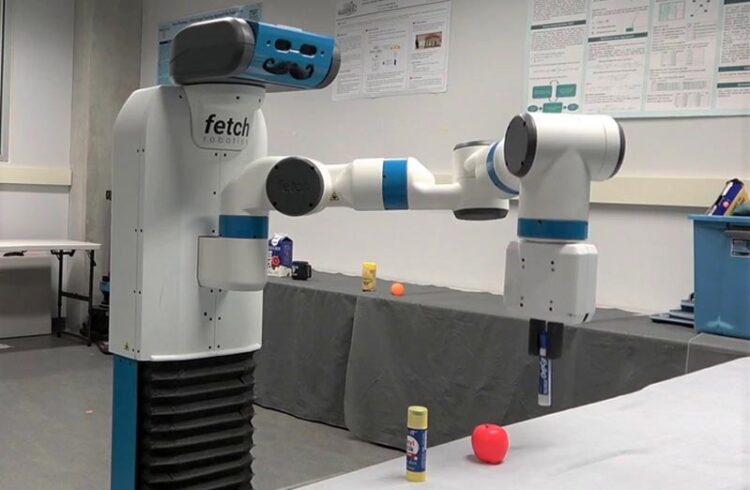Can’t find your phone? There’s a robot for that

Fetch, the robot used in the research
Credit: University of Waterloo
Robots can help find objects you’ve lost, thanks to new ‘artificial memory’.
Engineers at the University of Waterloo have discovered a new way to program robots to help people with dementia locate medicine, glasses, phones and other objects they need but have lost.
And while the initial focus is on assisting a specific group of people, the technology could someday be used by anyone who has searched high and low for something they’ve misplaced.
“The long-term impact of this is really exciting,” said Dr. Ali Ayub, a post-doctoral fellow in electrical and computer engineering. “A user can be involved not just with a companion robot but a personalized companion robot that can give them more independence.”
Ayub and three colleagues were struck by the rapidly rising number of people coping with dementia, a condition that restricts brain function, causing confusion, memory loss and disability. Many of these individuals repeatedly forget the location of everyday objects, which diminishes their quality of life and places additional burdens on caregivers.
Engineers believed a companion robot with an episodic memory of its own could be a game-changer in such situations. And they succeeded in using artificial intelligence to create a new kind of artificial memory.
The research team began with a Fetch mobile manipulator robot, which has a camera for perceiving the world around it.
Next, using an object-detection algorithm, they programmed the robot to detect, track and keep a memory log of specific objects in its camera view through stored video. With the robot capable of distinguishing one object from another, it can record the time and date objects enter or leave its view.
Researchers then developed a graphical interface to enable users to choose objects they want to be tracked and, after typing the objects’ names, search for them on a smartphone app or computer. Once that happens, the robot can indicate when and where it last observed the specific object.
Tests have shown the system is highly accurate. And while some individuals with dementia might find the technology daunting, Ayub said caregivers could readily use it.
Moving forward, researchers will conduct user studies with people without disabilities, then people with dementia.
A paper on the project, Where is my phone? Towards developing an episodic memory model for companion robots to track users’ salient objects, was presented at the recent 2023 ACM/IEEE International Conference on Human-Robot Interaction.
Media Contact
Ryon Jones
University of Waterloo
rnjones@uwaterloo.ca
Cell: 226-339-0894
All latest news from the category: Information Technology
Here you can find a summary of innovations in the fields of information and data processing and up-to-date developments on IT equipment and hardware.
This area covers topics such as IT services, IT architectures, IT management and telecommunications.
Newest articles

A new class of cosmic X-ray sources discovered
An international team of astronomers, led by researchers from the Astronomical Observatory of the University of Warsaw, have identified a new class of cosmic X-ray sources. The findings have been…

An open solution to improving research reproducibility
Academic and industry scientists collaborate on a new method to characterize research antibodies. Structural Genomics Consortium researchers at The Neuro (Montreal Neurological Institute-Hospital) of McGill University, in collaboration with scientists…

Living in the deep, dark, slow lane
Insights from the first global appraisal of microbiomes in earth’s subsurface environments. Which microbes thrive below us in darkness – in gold mines, in aquifers, in deep boreholes in the…



